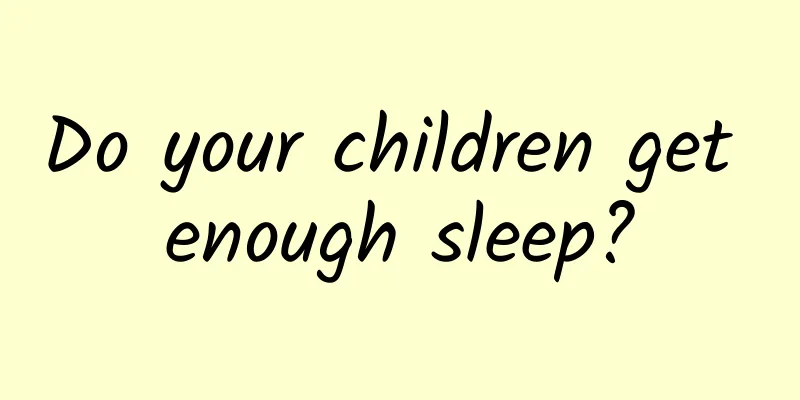Do your children get enough sleep?

|
March 21, 2023 is the 23rd World Sleep Day. The theme of this year's Sleep Day is "Good Sleep, Healthy Journey". Children's sleep disorders can cause a series of behavioral problems during the day. Poor sleep is associated with poor math performance and poor reading and writing performance. In addition, poor sleep is also associated with depressive symptoms and anxiety disorders. What kind of sleep is problematic sleep? 1. Dyssomnias ◆ Difficulty falling asleep ◆ Limitation setting sleep disorders ◆ Poor sleep hygiene ◆ Sleep deprivation syndrome ◆ Snoring and obstructive sleep apnea 2. Parasomnia ◆ Sleepwalking ◆ Night terrors ◆ Nightmare ◆ Rhythmic movement disorders such as head banging or rocking What is Insomnia Insomnia refers to the inability to fall asleep or stay asleep, resulting in insufficient sleep. It usually refers to a subjective experience in which patients are not satisfied with the sleep time and/or quality and their daytime social functions are affected, thus causing symptoms such as fatigue, restlessness, general discomfort, lack of energy, slow response, headache, and lack of concentration. The biggest impact of insomnia is mental, and severe cases can even lead to schizophrenia. With children, parents have to find clues themselves because children cannot express themselves clearly with words and they are very confused. What’s even more interesting is that the signs of sleep deprivation in children are completely different from those in adults. While adults become drowsy, children tend to be more hyperactive, inattentive, irritable, and angry. In fact, sleep deprivation in children is often mistaken for ADHD. How much sleep do children of different ages need? 1 Newborns: Sleep intermittently throughout the day and night, and need 14-17 hours of sleep per day. 2 Infants: Infants under 1 year old need 12-15 hours of sleep, including nighttime sleep and several daytime naps. 3 Toddlers: Children under 3 years old need 11-14 hours of sleep, including rest at night and naps during the day, just like babies. 4 Preschoolers: Children aged 3-5 need 10-13 hours of sleep. The frequency of naps can be reduced, but they can still be used to supplement nighttime rest. 5 Children aged 6-13: School-age children typically need 9-11 hours of sleep per night. 6 Teenagers aged 14-17: Teenagers need 8-10 hours of sleep every night. Sleep plays a vital role in physical, intellectual, emotional and social development during childhood and adolescence. Sleep problems in children can interfere with cognitive and intellectual development. Studies have shown that insufficient sleep can have a negative impact on children's language development, memory and learning ability. Poor sleep, including breathing patterns that disrupt sleep, has been linked to lower cognitive and intellectual abilities, as well as academic performance in children. Sleep-disordered breathing includes snoring, mouth breathing, sleep apnea, and any other signs of impaired breathing during sleep. Children who do not sleep well are at greater risk of behavioral problems and psychological distress in childhood and adolescence. At the same time, children with psychological problems are more likely to have difficulty sleeping. This shows that the relationship between sleep and mental health is bidirectional. How to help your child get a good night's sleep every night 01 Create a fixed sleep time for your child Just as with adults, having a bedtime routine for your child can help get them into a sleep pattern. This includes scheduling something relaxing instead of stimulating activities in the time before bed. Make sure your child doesn't do sports or eat sweets right before bedtime. Calming activities include reading, taking a hot bath, drinking milk, and hugging and kissing your child. Our bodies need these signals to calm down. If your child is old enough, ask him what he thinks helps them sleep. Try to repeat these "routine activities" with your child every night, and over time, he will know, "It's time to go to bed." 02 Maintain a regular sleep schedule A fixed sleep and wake-up time is very important. Doing fixed things at fixed times every day can help children grow better. For example, if you want to go to a movie together, if you have a choice, try to watch an earlier show. 03. Persistence in execution Children always procrastinate before bedtime. They want you to read them one more story, give them one more hug and kiss, give them one more glass of water, and they will do whatever it takes to stay up later. For working parents, it's especially hard to enforce a sleep schedule. They don't get to spend time with their kids during the day, just a few hours at night. Many parents even feel a little guilty about it. But don't feel guilty about trying to get your kids into good sleep habits. Don't let "stalling tactics" become your kids' routine. Set limits in a kind and calm way. 04 Get everyone involved Get the whole family ready for bed together, especially if your children are younger. Dim the lights in the house, change into pajamas, wash and brush your teeth together. One reason children like to stay up late is that they "feel like they are missing out on something." Let them know that it is dark outside, there is nothing to do, and everyone is sleeping. 05. Don’t lie in bed with your child Some parents tend to lie in bed with their children to help them sleep. But this actually makes the children feel that they need you and cannot sleep without you. So when you are not there, can the children still sleep well? 06. Teach your child to calm down It's important for children to learn to fall asleep on their own. For example, parents should put their children in bed when they seem calm and sleepy, rather than waiting until they are asleep. Sing lullabies to children while they are in their cribs, then gradually leave the room. Author: Liu Juan Liuzhou Tanzhong People's Hospital Reviewer: Liao Lihong, member of the Standing Committee of the Science Popularization Working Committee of the Chinese Rehabilitation Medicine Association, Vice President of Liuzhou Tanzhong People's Hospital The popular science content of this platform has been funded by the China Association for Science and Technology's Science Popularization Department's 2022 National Science Literacy Action Project "National Society Science Popularization Capacity Improvement Project-Rehabilitation Science Popularization Service Capacity Improvement Action Plan" |
<<: Is Alzheimer's disease really just confusion?
>>: How much do you know about incontinence-related dermatitis?
Recommend
What is the cause of blood in the vaginal discharge after menstruation?
Menstruation is the most important physiological ...
Causes of blood clots during menstruation
We know that it is normal for women to have abund...
What causes genital itching?
Vulvar itching is caused by many situations, and ...
What if the first menstrual flow is heavy after abortion?
If the first menstrual flow after an abortion is ...
Symptoms of mastitis during lactation
I believe everyone knows the importance of breast...
Will seborrheic alopecia cause hair loss in women?
Generally speaking, the incidence of male hair lo...
What causes acne on women's chin?
Many people have experienced acne on their faces....
How many days after sex can I use a test strip to detect pregnancy
Nowadays, the pressure of life is relatively high...
How to increase female sexual desire
Sexual life is the bond of emotional communicatio...
How big is the gestational sac at 44 days of pregnancy?
44 days of pregnancy is considered early pregnanc...
Helicobacter pylori infection is attracting more and more attention
The sudden outbreak of the COVID-19 epidemic has ...
Can I still get pregnant after a second ectopic pregnancy?
After a man and a woman form a family, they hope ...
Is it painful for women to remove the IUD?
The purpose of having an IUD inserted is to bette...
A small amount of bleeding after exercise during ovulation
Female friends will experience ovulation before t...
For people with high blood pressure who want to lower their blood pressure to normal range, how long will it take?
A friend was just diagnosed with high blood press...


![[Medical Q&A] What kind of lumbar disc herniation requires surgical treatment?](/upload/images/67eff898adc85.webp)






